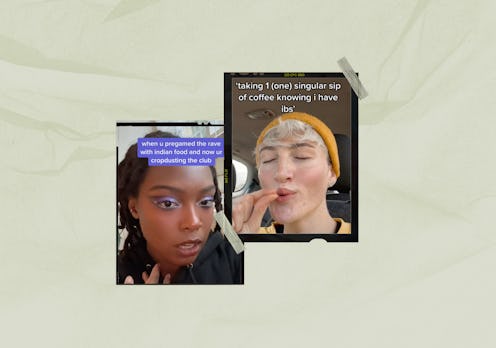Wellness
Why TikTok Thinks "Hot Girls Have IBS"
Turns out everyone is #bloated
When you’re in the bathroom for the hundredth time with a grumbling stomach, it can seem like you’re the only person on the planet who deals with IBS, or irritable bowel syndrome. Surely no one else has had to memorize the location of every public restroom within a 10-block radius, right? But then you stumble upon the “hot girls have IBS” trend on TikTok, and it suddenly becomes clear that the condition is way more common than you might think.
With over 14 million views, the #hotgirlshaveibs hashtag is rife with super honest videos posted by folks who bloat and cramp and make countless trips to the bathroom throughout the day and night. For ages, IBS has been one of those “gross” personal topics that nobody wanted to talk about, when in reality millions of people have IBS, so there’s really no need to stay quiet in your own, personal bathroom stall of shame.
The idea to normalize IBS — and even make it kind of #relatable — started with Katie Wilson, the CEO and co-founder of gut health brand BelliWelli, who recently put up a huge “Hot Girls Have IBS” billboard. “People really appreciate a forum to feel seen and heard about their own personal gut struggles,” Wilson says about the trend. “So much of managing gut issues is not feeling alone. Having a community makes all the difference." Read on for more on the social media movement.
Hot Girls Have IBS
One person who posted under the #hotgirlshaveibs tag is Nadya Okamoto, the co-founder and CEO of sustainable period brand August, who says she’s been honest about her IBS and constipation issues on social media for a while now.
“Part of why I started posting was because I think I was looking to feel less alone about my bowel issues, and as shown by the current trend, it’s much more common than I thought,” Okamoto tells Bustle. By sharing brutally honest videos about her IBS symptoms — which can include gas, bloating, constipation, and diarrhea — Okamoto started to reframe what the condition means for herself.
“It was something that my family always jokingly teased me about, and something a lot of my friends had laughs about, too,” she says. “Of course I laugh, because it’s funny to talk about poo. But it’s also very painful and frustrating to not be able to poop for weeks at a time, and that can be a really isolating feeling when everyone else around you seems to have perfectly fine bowel movements.”
Thanks to the notion that hot girls have IBS, hundreds of thousands of others have started to get real, real honest about how much time they spend on the porcelain throne. Or how one sip of coffee sends them running for the bathroom.
“I like that this is a conversation now happening online, not only because it makes people experiencing IBS feel less alone, but it also opens up conversations to trade suggestions and solutions,” Okamoto says. Read through the comments and you’ll likely learn about different ways to treat IBS, plus plenty of tips to cope with some of its peskier symptoms.
Of course, it’s important to keep in mind that what works for one person on TikTok might not work for you. “IBS covers so many different symptoms and can be caused by so many different things, so listen but also stay focused on your own bodily symptoms and your own journey,” Okamoto adds. In fact, she recommends asking your doctor for advice, above all else. “For so long I would feel embarrassed even bringing up constipation with my doctor, when in reality I should’ve talked to them first,” she says.
While the cause of IBS isn’t well understood and it’s often used as an “umbrella term” for a wide array of symptoms, there are lots of options when it comes to treatment.
Whether you choose to take a trip to the doctor or simply want to feel less alone, the idea that “hot girls have IBS” really does provide a sense of solidarity. And hey, if your IBS inspires you to join in on the hot girl trend, you could even share your own story — the more hilarious and honest, the better.
This article was originally published on
